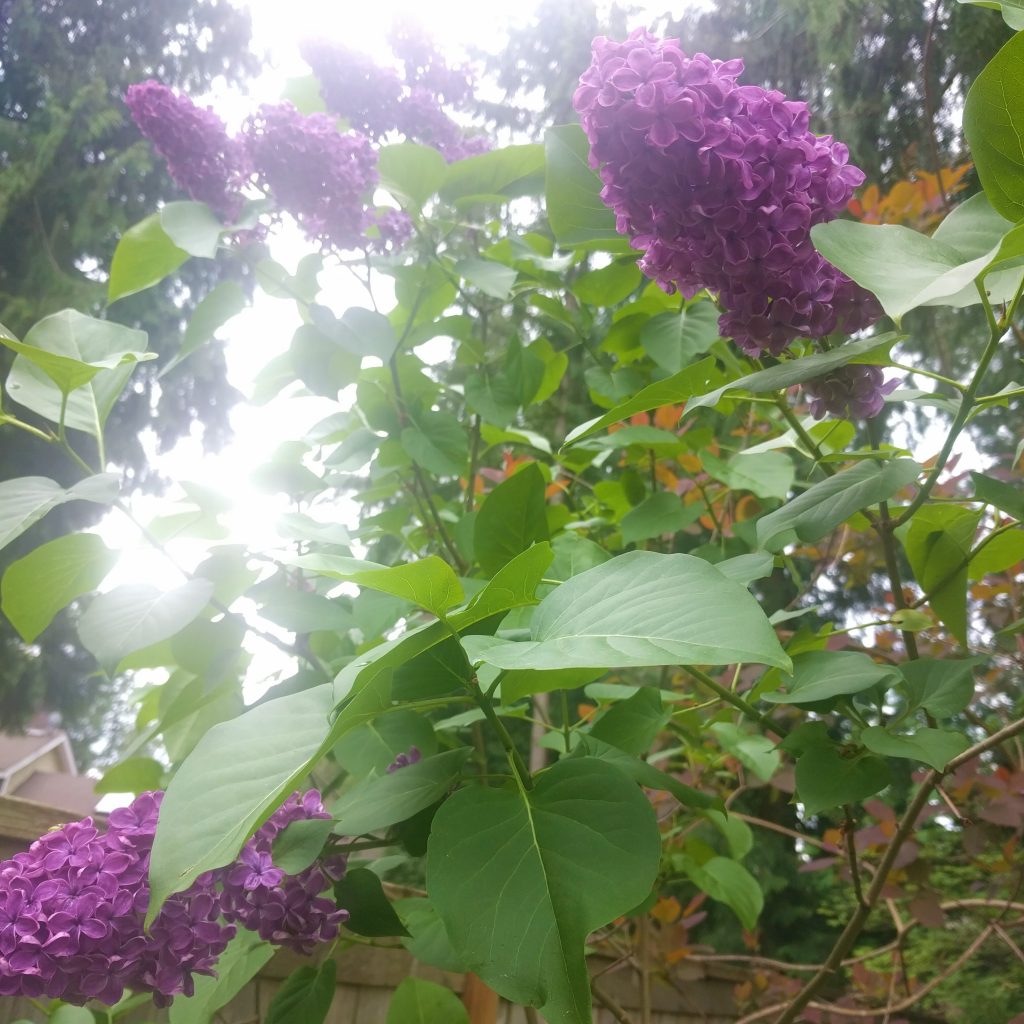For the Love of Lilac
Some people think that I’m super sensitive to fragrance. And it’s easy to understand why. I can sniff out anyone’s laundry detergent floating on the breeze or scented hand soap on my daughter after school.
The word sensitive in our society denotes that something is wrong. Being sensitive to anything is usually considered a fault or weakness.
But when it comes to fragrance, the fragrance of a flower or a chemically made fragrance, being sensitive is a very good thing.
Lilacs have been in bloom here recently. My neighbor and I swoon over the scent of them wafting between our houses. Lilacs remind us of special times in our childhoods. When cut and placed in the kitchen, their scent in the morning lifts my spirit. And catching the sweet scent of lilac during story time in the hammock makes the moment even more magical. I’m delighted that I can smell even the faintest hint of lilac.
Benefits of the Olfactory Sense
Our olfactory sense, or sense of smell, is for enjoyment, health and protection (among other benefits). I enjoy the scent of real lilac, the salty ocean and chocolate. When I smell dinner cooking it begins the process of digestion. And when a scent is added to natural gas, it can warn us of a dangerous natural gas leak because we associate that added scent with a gas leak.
Interestingly, our olfactory sense can be quickly overwhelmed. By overwhelmed I mean unable to detect further smells once a certain threshold has been reached.
The first deep breath into a stem of lilac is divine. The second pales in comparison and by the third, it seems to have disappeared altogether. Try it.
In a larger context, I believe this is why it appears that I’m so “sensitive” to fragrance. When I go out in public I quickly catch the scent of various perfumes, detergents and burning candles. I even smell the medley of scents coming from the various homes that our library books have been in. And its all “yuck” to me. It’s yuck because I know that smells like this are chemically made and come with a host of poisons that are designed to cling to whatever they can. These smells are the smell of danger to me.
The reason I’m “sensitive” or can smell them when others can’t, I believe, is because my home and personal environments have very few fragrances in them. And whatever fragrance is present here is most often in its natural form.
It’s true, I do use Essential Oils, which is a concentrated form of a natural substance. And while I make sure to only use therapeutic grade essential oils that have been rigorously tested for safety, I typically use them sparingly because they are so potent. I do not diffuse them. I haven’t found much benefit to that and I believe that it’s an intrusion on the people around me.
So, I’m not constantly overwhelming my olfactory receptors and thus dulling their ability to pick up the scent of what’s around me. This causes me to seem overly sensitive to the chemically made fragrances used by people around me.
Scent is Molecules of a Chemical or Real Substance
During my recent pregnancy, my sense of smell was heightened as expected. However, it was surprising to me how much MORE I could smell than what is even typical for me. My take away from this time is that there is SO MUCH MORE for us to smell than most of us, even me, are aware of moment to moment. And I want this basic sense, the sense of smell, to be in good working order, not clogged up by manufactured scents everywhere I go.
Remembering Dr. Lampman’s teaching in Organic Chemistry (one of my favorite subjects in college), what we smell is actually the molecules of the given substance being received by our receptor sites. Meaning, that when you smell someone’s fart, you are getting a very small piece, or molecule, of their poop in your nose.
The more smelly molecules we receive the more our receptor sites are occupied and can’t receive other scents at the same time. Most people who continue to use scented products – naturally or chemically scented – have their receptor sites continuously occupied.
Take for instance if you wear perfume or wash your clothes in a scented detergent the scent fills your receptor sites all day long (assuming that you wear clothes all day). The scent of these products are designed to stick to you and your clothing by the use of phthalates.
There’s talk that some people even have a fragrance addiction. This makes sense because the messages of scent are directly wired to the brain. More on fragrance addiction another day…
For now, it makes sense that if we are constantly awash in fragrance from perfume, laundry detergent, soap, etc., it takes more and more fragrance in the air to be able to detect it at all. And at some point we become unable to detect what is really present.
Free and Clear, for Real
For me, my receptors are free and clear to accept whatever scents come my way. This is should allow me to detect danger at a lower level and also receive pleasure from a garden scent much faster than someone who is still using chemically or “naturally” fragranced products.
Last year I toured the Theo Chocolate factory in Seattle. I could smell chocolate from where we parked blocks away. It was divine. And inside the factory I reached a whole new level of chocolate ecstasy! The richness of their chocolate must have been hitting every receptor site available! Although, like any scent, the more I lingered the less I noticed it.
So being sensitive to fragrance is a really good thing. It seems that I can detect natural scents more easily and the pleasure of these is very rich! And I can sense danger in the form of scent before most people. I’m pretty happy about that.
Manufactured Fragrance Harms Us
My wish for others is that they too can understand the dangers of manufactured fragrance. Because this kind of fragrance has such a negative effect on health, it is now considered to be the new “smoking”. And the second-hand “smoke” from fragrance is just as significant. Officially, according to a study by Anne Steinemann, heavily scented people and their things/spaces are offensive in public and cause people to feel unwell. 1 in 3 Americans report suffering adverse health effects from being exposed to scented products. Adverse health effects include asthma, migraine headaches, and cognitive, gastrointestinal, cardiovascular, musculoskeletal and skin problems.
And this doesn’t even dive into the fact that these fragrances can be considered Endocrine Disrupting Chemicals that interrupt the basis of cellular communication, our hormones.
Most every regular and “organic” products used for cleaning and personal care contain fragrance. And since fragrance can be considered proprietary (thus not required to be labeled), the dangers in these products is largely unknown, containing a mixture of up to hundreds of chemicals. (Check out the movie Stink! for details on that.) Whether you are addicted to scent, can’t smell a thing anymore, or feel overwhelmed by chemical fragrances around you, removing chemically based products in your daily routines of cleaning and personal care can help immensely. Choosing not to use fragranced products will benefit you and everyone around you.
It can be daunting to consider replacing scented products in your life, but it doesn’t have to be. I’d love to talk with you more about how I can help you do it simply and replace them with nourishing solutions instead. Check out my LightenUp Simply consultation service or send me a message.


